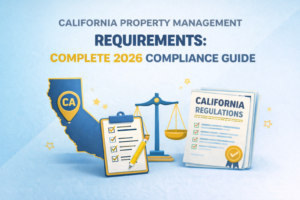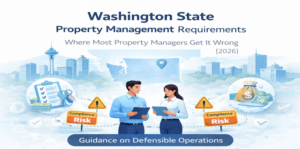
In the hyper-connected age of digital commerce, simply having a robust property portfolio isn’t enough. The real challenge lies in effectively marketing your property to a global audience. In the field of property management, marketing plays an indispensable role when it comes to transforming leads into loyal tenants. The domain of marketing for property management has shifted dramatically from older traditional methods to more advanced and digital strategies.
Digital Marketing: The New Normal
Today traditional advertising channels such as print ads, billboards, and direct mail have been sidelined by their digital counterparts. The reasons? Digital marketing is able to offer better targeting, measurability, and a higher return on investment. Whether it’s social media ads targeting millennials looking for their first apartment or search engine optimization (SEO) strategies to rank higher on Google searches, the digital realm is rich with opportunities and is really diverse.
SEO and SEM: The Cornerstones
When potential tenants try to search for properties, the first place they often turn to is a search engine. Therefore, it is necessary that you ensure your property listings appear prominently in search results. This is where SEO comes into play. Properly optimized websites and content can rank higher, increasing the visibility of your listings.
On the other hand, Search Engine Marketing (SEM) allows property managers to place ads of their assets in search results, giving them an edge over organic listings. Paid ads can be especially useful during peak leasing seasons or when promoting a new property.
Social Media: Building a Community
Platforms like Facebook, Instagram, and LinkedIn offer more than just space for advertising. They are tools for building communities, sharing testimonials, showcasing property images, and engaging with prospective tenants. Engaging content, from virtual property tours to tenant testimonials, can be shared, increasing organic growth and brand loyalty.
Email Marketing: Keeping Leads Warm
While it may seem old-school, email marketing remains one of the most effective methods of digital marketing for property management. Sending monthly newsletters, property updates, or exclusive offers can keep your leads engaged and connected. Drip campaigns can nurture cold leads over time, warming them up until they’re ready to sign a lease.
Online Reviews and Reputation Management
Today’s tenants are tech savvy researchers. Before making a leasing decision, they often search online reviews on platforms or websites like Google, Yelp, or specific property management review websites. Encouraging satisfied tenants to leave positive reviews and promptly addressing any negative feedback can significantly improve your online reputation.
Analytics: The Backbone of Digital Strategy
The beauty of digital marketing for property management lies in its measurability. Tools like Google Analytics provide in-depth and comprehensive insights into website traffic, user behavior, and conversion rates. Monitoring these metrics helps property managers understand which strategies work and which need revision or improvement. Continuous analysis and optimization are the keys to ensuring your marketing efforts deliver the desired results.
Mobile Optimization: Catering to the On-the-Go Tenant
We live In an era where most searches happen on mobile devices, so having a mobile-optimized website is no longer optional but is a must have for any property manager. Responsive design ensures your website looks and functions perfectly, whether viewed on a desktop, tablet, or smartphone. The smoother the user experience, the higher the chances of converting a casual visitor into a potential lead.
The Virtual Viewing Experience
With the onset of the pandemic, the adoption of VR and AR technologies in property showcasing has seen a remarkable upswing. Virtual tours have become a standard feature in many property listings, providing a realistic, immersive viewing experience to prospective tenants, all from the comfort of their homes. Augmented Reality takes this a notch higher by allowing prospects to virtually place their furniture and decor within the desired space, giving them a feel of what living there might be like. Besides, these virtual viewing options significantly increase and broaden your reach, allowing international prospects to explore your properties without geographical constraints. By investing in VR and AR, property managers not only stay ahead in the digital curve but also add a significant value proposition to their listings. These technologies are also able to save time for both the property managers and the prospects by filtering out uninterested parties, leaving only serious inquiries.
Utilizing Customer Relationship Management (CRM) Systems: A Structured Approach
Customer Relationship Management (CRM) systems have proven to be a true game-changer in managing interactions with current and potential tenants. A robust CRM system will help property managers track preferences, interactions, and feedback of their leads, enabling a more personalized follow-up. Furthermore, a CRM that is integrated with marketing automation tools can significantly streamline the marketing efforts, ensuring timely engagement with the leads through emails, messages or calls, all from a centralized platform. Through analyzing the data collected, property managers can refine their marketing strategies to better cater to the interests and needs of their target audience, thereby enhancing the lead conversion rate. In the long run, a personalized and data-driven approach facilitated by a CRM system not only contributes to a better tenant experience but also fosters a long-term tenant relationship, which is invaluable in the property management realm.
The Future is Integrated
Digital marketing for property management isn’t just about isolated tactics; it’s about creating an integrated strategy where every element complements the other. For instance, a PPC ad campaign can drive traffic to your website, which then encourages visitors to sign up for your newsletter, thereby feeding into your email marketing strategy.
Furthermore, as technology continues to evolve, property managers must stay updated with the latest digital marketing trends. Emerging technologies such as AI-driven chatbots or augmented reality property tours could soon become standard tools in the property manager’s digital marketing toolkit.
Conclusion
Digital marketing for property management is no longer a luxury; it’s a necessity for realtor. As more prospective tenants turn to the internet to find their next rental, property managers must employ a cohesive digital strategy to capture these leads and convert them into leases. By leveraging the power of SEO, social media, email marketing, and more, property managers can ensure their that listings are seen by the right audience, at the right time. Remember, in the fast-paced world of digital marketing, adaptability, and continuous learning are your allies in success.
Table of Contents
Stay Updated
Subscribe to get the latest news, industry trends, blog posts, and updates...




